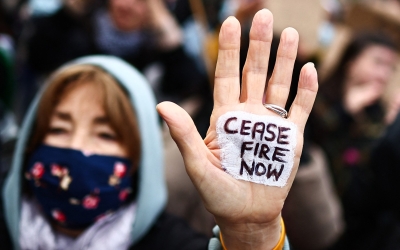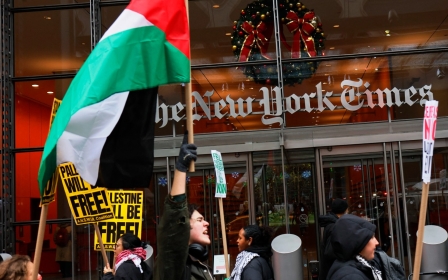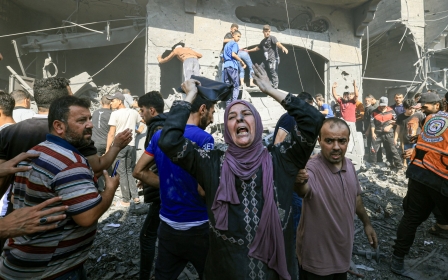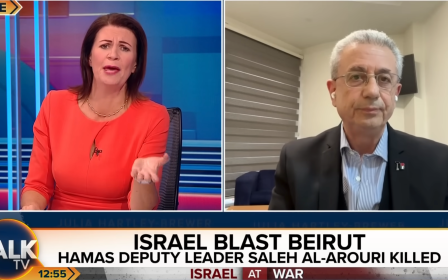War on Gaza: How British media favours the Israeli narrative
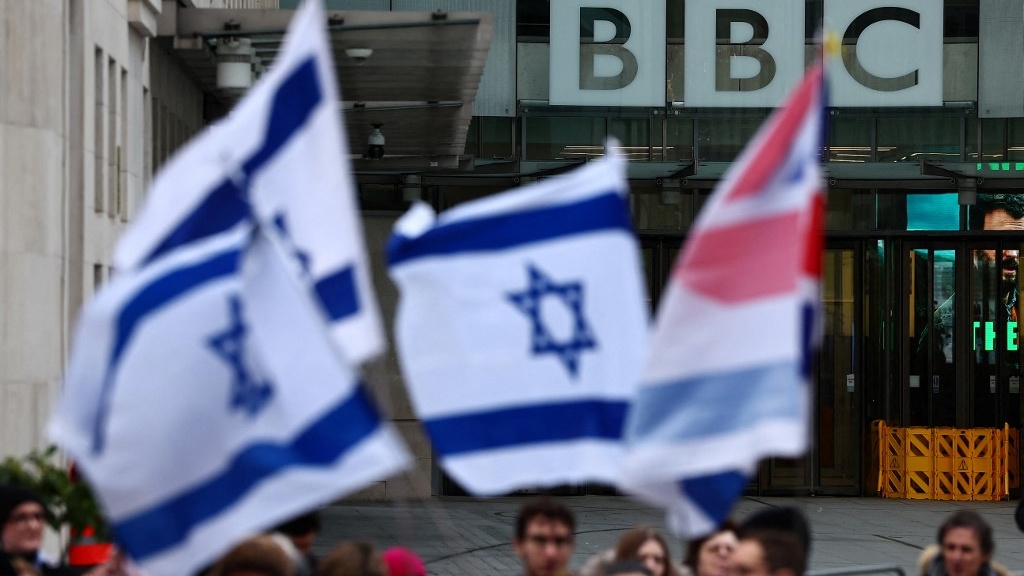
In the first month of the war on Gaza, the media used terms such as “slaughter”, “massacres” and “atrocities” to describe the killing of Israelis around 11 times more often than they did to describe the killing of Palestinians.
This is among the findings of a new report analysing coverage of the war on Gaza from the Centre for Media Monitoring, which looks at representations of Muslims in British media. The report comes as the death toll in Gaza soars past 30,000.
Journalists at the BBC last year wrote a letter highlighting what they described as bias in the broadcaster’s coverage of the war - and they certainly have a point.
Still, some pro-Israel advocates remain dissatisfied, suggesting that certain terms should be exclusive to the 7 October Hamas attacks. In one example cited in the centre’s report, a Conservative politician accused a mainstream British journalist of using “emotive language” when he called the killing of Palestinians in Gaza a “slaughter”.
Indeed, an analysis of British media coverage shows a widespread failure to represent Palestinian voices and concerns, with almost three-quarters of attributions across broadcast television favouring an Israeli source or viewpoint.
The report shows an imbalance that prioritises Israeli narratives, in a conflict where competing claims have always been difficult for journalists to navigate. The unequal framing has led to repeated demands on television guests and commentators to acknowledge Israel’s “right” to defend itself, referenced more than five times as often as the right of Palestinians to defend themselves.
As the writer and trade unionist Andrew Fisher retorted on the BBC: “We’ve heard Israel has the right to defend itself, does Palestine?”
Lack of context
Looking at the extent of coverage has been challenging, with more than 176,000 broadcast news clips and almost 26,000 online news articles appearing in just one month after the 7 October attacks.
But clear patterns emerged. Despite the fact that the conflict consists of an occupying state and an occupied people, one international broadcaster (Al Jazeera English) made more mentions of “occupied territories” than all British news channels combined. Out of nearly 100,000 references to Gaza, there were just 28 mentions of “occupied Gaza” - a de facto situation amid Israel’s siege - and half of those were on Al Jazeera English.
Follow Middle East Eye's live coverage of the Israel-Palestine war
This speaks to a larger issue with media coverage, namely a lack of context, despite efforts by Palestinians to remind viewers and readers that they have suffered repeated massacres and humiliations in the 75 years before 7 October. Some have been subsequently accused of trying to justify the Hamas attacks.
Islamophobia, which has been described as a major factor in the defence of genocide, has been widespread across right-leaning media
The idea that those who advocate for Palestine are supporters of terrorism has been given significant airtime, even before the polemic was turbo-charged by the British prime minister after the election of George Galloway as Rochdale’s new MP.
A striking fact absent from UK media coverage is that there have been fewer arrests at the “openly criminal” Palestine protests than at the Glastonbury summer music festival held in southern England. Right-wing news channels, particularly GB News and TalkTV, have been at the forefront of framing the protests as pro-Hamas, with demonstrators described as “giving an alibi to evil” and enacting “terror on our streets”.
In one case that went viral, the BBC corrected its description of protesters as “backing Hamas”, but other examples have gone unchallenged.
It has not been an easy balance to strike for the BBC in particular, as the broadcaster has been name-checked by Israeli President Isaac Herzog for not following the Israeli line when it comes to labelling certain groups as “terrorists”.
Unverified claims
Yet, despite the relentless attacks from pro-Israel commentators and politicians, it was notable to see a Guardian article about “distressed” BBC staff featuring an image of a young pro-Palestine protester holding a placard critical of the broadcaster.
It is now commonplace for photo desks to link the Palestinian flag and other national symbols with extremism and antisemitism. An October Guardian piece discussing a rise in antisemitic incidents, for example, used a photo of pro-Palestine demonstrations, later acknowledging it was inappropriate and swapping it out for a photo of a vigil for Israeli victims of the 7 October attacks.
Horrifying claims about beheaded babies and mutilated women were given front-page coverage in British media, without the journalistic vigour to establish their veracity. A recent ruling by the UK media regulator Ipso cleared the Sun newspaper of wrongdoing by noting that it reported the “beheaded babies” incident as a claim rather than an established fact.
This points to another issue we found: an apparent readiness among many media outlets to accept Israeli claims and narratives, while doubting what is said by Palestinians. The huge increase in affixing the label “Hamas-run” to the Gaza health ministry after the al-Ahli hospital attack in October is just one example.
Islamophobia, which has been described as a major factor in the defence of genocide, has been widespread across right-leaning media, with editors and commentators pushing a narrative of Muslim antisemitism that they imply is rooted in the religion of Islam itself.
It remains to be seen whether the communications regulator Ofcom will become stricter in holding to account expressions of anti-Arab and Islamophobic rhetoric. A good start would be to redress the balance in what has been a mostly one-sided affair of covering Israel’s war on Gaza.
The views expressed in this article belong to the author and do not necessarily reflect the editorial policy of Middle East Eye.
Middle East Eye propose une couverture et une analyse indépendantes et incomparables du Moyen-Orient, de l’Afrique du Nord et d’autres régions du monde. Pour en savoir plus sur la reprise de ce contenu et les frais qui s’appliquent, veuillez remplir ce formulaire [en anglais]. Pour en savoir plus sur MEE, cliquez ici [en anglais].



